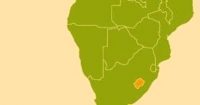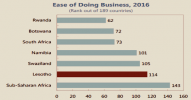Located in the south eastern region of Southern Africa and entirely surrounded by South Africa, the Kingdom of Lesotho covers an area of 30,355 km².
Lesotho is the only country in the world to have all its entire territory located at more than 1,000 meters above sea level. More than 75 % of Lesotho is mountainous, with only 25 % considered lowland. The lowest point is 1,388 meters rising to almost 3,500 meters in the Maloti mountain range which forms the border with South Africa to the north east and south west.
Climate
Lesotho has a continental climate, with four distinct seasons and extremes of temperature. Spring is from August to October, summer extends from November to the end of January. Autumn, which runs from February to April, is harvest time in Lesotho and lastly winter months from May to July bring snow with dry, sunny days and cold nights. Temperatures do not get unbearably high, due to the altitude. Temperatures can drop as low as -10 °C.
Population
The population of Lesotho is about 1,879,000 (2011). The vast majority of the population is Basotho with small groups of Europeans and Asians. Lesotho is inhabited by the Basotho people and the official languages are Sesotho and English. The capital is Maseru, with other major population centers being Mafeteng and Roma.
Investors with financial strength, managerial and technical skills, and marketing capabilities are required to form joint ventures with local investors.
The major investment areas are:
- Clothing and blanket manufacture
- Furniture
- Footwear production
- Agro-industries, especially in processing of locally produced wool and mohair, establishment of mineral water bottling operations.
- Electrical or electronic consumer products – strategic partners to produce TV sets, video cassette recorders, electronic stoves, microwave ovens, refrigerators, washing machines and dryers, telecommunications equipment .
- A wide range of potential projects in the manufacturing, construction and services sectors connected to the Lesotho Highlands Water Project.
- Consulting engineering services for rehabilitation of rural hospitals.
- Hotels, lodges and other facilities catering for tourists.
- Road rehabilitation and maintenance.
- Health care equipment.
- Production of high quality rock-wool for insulation.
Use of local clays for production of ceramic products such as sanitary ware, stoneware utensils, glazed advertising slabs
Economy
The economy of Lesotho is based on subsistence farming and animal husbandry, as well as small-scale industries that include clothing, footwear, textiles, food processing and construction.
The small manufacturing base depends largely on farm products to support the milling, canning, leather and jute industries. The great majority of households gain their livelihoods from subsistence farming and migrant labor, with a large portion of the adult male workforce employed in South African mines.
Best known for its diamond exports, there are also proven deposits in Lesotho of other minerals and semi-precious stones.
After four years of robust growth averaging 4.3% annually, growth dropped to an estimated 3.4% in 2015, largely due to weakness in the construction and manufacturing sectors and it is expected to remain subdued in 2016 and 2017.
Unemployment, poverty and inequality have remained pervasive in the face of non-inclusive growth. The high rate of urbanization has outpaced the ability of the authorities to provide necessary services, and the sustainability of living conditions for much of the urban population remains a critical challenge, according to Africa Development Bank’s report – African Economic Outlook 2016.
Tourism
The Lesotho Highlands are the country’s main tourist attraction. Spectacular cliff formations and deep gorges are found in the Maloti and Drakensberg mountain ranges in the south of the country.
The Maloti/ Drakensberg, a world heritage site, are home to some 2,500 species of plants and contain the world’s richest concentrations of Stone Age rock art, with more than 30,000 individual paintings recorded.
Landmarks in Lesotho include Mount Qilone, and Thaba Bosio, a fortress stronghold where the kings of Lesotho are traditionally buried. Thabana Ntlenyana, at 3,483 meters, is the highest mountain in Southern Africa, whilst Maletsunyane Falls is one of the tallest single-drop waterfalls in the region plunging for 192 meters and Sehlabe-Thebe National Park.

Investment benefits and incentives
Lesotho is a signatory to the convention on the settlement of investment disputes between states and is a member of the Multilateral, Investment Guarantee Agency. Furthermore, as a member of the International Monetary Fund, Lesotho has accepted the obligations of the Articles of Agreement, thereby giving confidence to the international community of its pursuance of sound economic policies, contributing to a multilateral payments system free of restrictions.
Lesotho’s central position also provides distinct advantages. For investors Lesotho offers a highly competitive environment that is conducive to productivity. The current investor package includes the following:
- A stable social and political environment that is investor friendly, with a free enterprise and free market economic system forming the basis for sustained development and growth
- A low corporate tax rate of 15 % on profits earned by manufacturing companies, with free repatriation of profits, as well as no secondary or withholding tax on dividends distributed by manufacturing companies to local or foreign shareholders. (Refer also to Banking and insurance)
- A comprehensive export finance facility to support exporters with working capital on concessionary terms and unimpeded access to foreign exchange
- Loan guarantees, with long-term loans and/or equity participation in strategic projects
- General sales tax exemption on capital machinery and equipment for manufacturing industries, as well as full rebates on imported raw materials or components used solely in the processing or manufacturing of goods for the export market, thus enabling manufacturers to offer credit facilities to customers
- An abundant labor force that is predominantly English speaking, literate and well-motivated, with high productivity and competitive wage rates
- A non-repayable skills training grant that covers up to 50% of the wage bill during the initial training period for newly established manufacturing company.
- Availability of serviced industrial sites and purpose-built factory shells for rental at competitive rates.
- Declining water and electricity tariffs as a direct spin-off from the Lesotho Highlands Water Project.
More information on investment opportunities in Lesotho can be found by contact the Trade Promotion Unit, Ministry of Industry, Trade and Marketing – Tel : (+266) 322138 Fax : (+266) 310644

